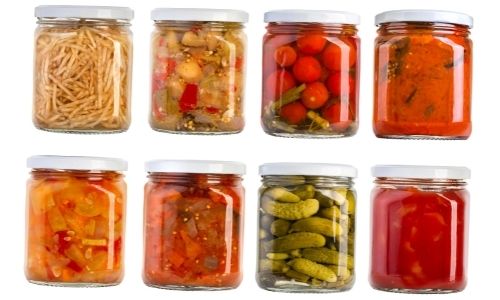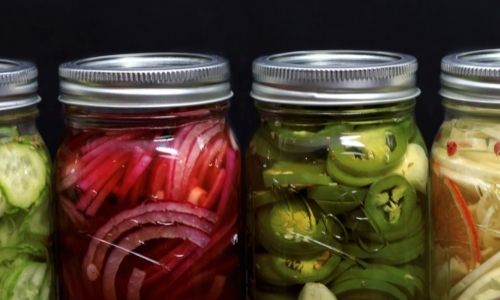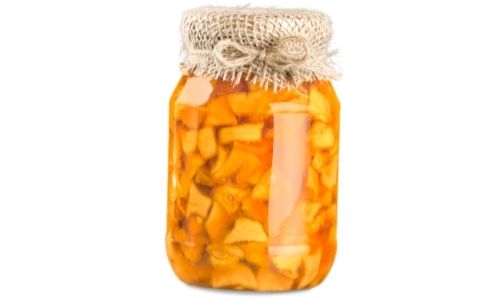
Pickles are one of those few food items that provide health benefits while being extremely delicious. This is why it is always stored in bulk, especially during summers, as they work as an impeccable summertime treat.
To prevent them from going bad, pickles are often refrigerated. But is this the right way to store them? Should they be kept at room temperature instead?
If you have such questions in your mind, the following article will answer all of them. Go through it and learn the proper ways to store pickles so that you can enjoy their tanginess for a long period.
Is It Necessary To Refrigerate Your Pickles?
To keep the pickle in your fridge or not depends on whether it is pasteurized or unpasteurized.
This means if you have pasteurized pickles (there is no longer any fermentation because all of the bacteria have vanished), you can store them at room temperature, as the process of pasteurization destroys good bacteria in the bottle. Thus, the fermentation comes to a halt.
Most importantly, when you keep that at room temperature, you have to follow some precautions, like keeping it away from direct light and heat sources. Basically, choose any dark place in your kitchen that is away from your stove.
If you have unsealed the bottle, storing pickles in the refrigerator is necessary.
However, the storing process is different when it comes to unpasteurized pickles. By this, we mean that once you buy pickles, storing them in the fridge is necessary even if you have not unsealed the cap.
Right now, you’re probably wondering why to do so, right?
Well, it is because the good bacteria in the pickle bottle are still living, which means fermentation is still in process. Thus, you need to reduce its speed and store it in the fridge.
However, even if you don’t keep it in the refrigerator, the fermentation process will still keep on working. Thus, the pickles will turn too sour. Well, some people prefer too much sourness, but the majority of the people don’t.
So, if you are also the one who doesn’t appreciate extremely sour pickles, then you know what to do.
Conditions for storing non-refrigerated pickles
So, if you have non-refrigerated pickles, then storing them with the correct method will help you maintain their shelf life.
If you want to do so, you have to ensure that the pickle is kept safe between 30-50 degrees F. Under this temperature, your pickles can last for 1-2 years. No rays of sunlight should strike the pickle jar.
Along with this, you have to make sure the humidity is maintained at 80-90%. If you didn’t fail to maintain the ideal humidity, pickles could remain fresh for 8-9 months.
Next, you have to get a good-quality air-tight container because once you unseal the cap of the pickle jar, it must be tightly closed. This will prevent them from contracting bacteria. And eventually, your pickles will be safe to eat for a long time.
Did you know storage methods also affect the taste of the pickle, and each method leaves a distinct characteristic?
If you wish to grasp some of the popular storage methods, check the next section.
The Best Way To Store Pickles
In this section, we will unfold some of the best ways to store pickles only for you.
1. Store pickles in jars

Everyone knows this method; even you and I must have used this method all the time to store pickles at home.
Tip: Pickles should be preserved in tiny portions in 1-2 liter jars to avoid them from rotting once opened.
So far, you know the rules for storing pickles in jars. Next, learn how to do this in barrels.
2. Store pickles in barrels
Did you know that preserving pickles in barrels is a centuries-old practice? It began when Jewish immigrants brought dill pickles to the New York borders in the late 1800s and early 1900s.
And when it comes to storing pickles in barrels, one should always use the brine for natural fermentation at a temperature ranging from 32°F to + 34°F.
Because the fermentation process continues and the bacteria modify the chemistry of the brine over time, the pickles within begin to deteriorate.
If you compare this with the jar method, the pickles in the barrels have a concise shelf life of nearly a month. In this period, pickles become strong and sour.
And once the shelf life is gone, the pickles in the barrels tend to become softer. And the taste also changes.
3. Freeze your pickles

Are you amazed by reading this storage method on our list? Well, it is indeed true. You can practically freeze pickles.
Note: Once you thaw these pickles, you can only use them with hot dishes.
The method of preparing frozen pickles is unique and different from the traditional method of pickling.
In the traditional method, the brine solution is boiled and poured over the cucumbers. In the frozen method, the cucumbers are blended with a room temperature solution.
Later, it is refrigerated and frozen. Keep in mind to use an air-tight container for this.
Tip: If you want to experiment, you can make 2 batches of pickles, one of which you can keep in the fridge and the other in the freezer.
If you like crispy pickles, go with the freezer option. And if you prefer regular crunch, go with the fridge option.
If you choose frozen pickles, then there is one drawback. Although this pickle keeps the most beneficial microelements like vitamins and minerals, flavor, and smell, it also gets softened and loses elasticity over time.
However, this does not detract from the meal in any way. So don’t worry about that.
Make sure to thaw frozen pickles in the fridge, and after that, you can use them again and keep them in the refrigerator. Make sure to use them within two weeks.
Note: Bacteria can thrive when frozen food thaws at temperatures over 40°F, resulting in foodborne diseases. Keep pickles out at room temperature for more than two hours once thawed.
Do you want to know whether your pickles have gone bad or not? Well, scroll down to know.
5 Ways To Know If Your Pickle is Rancid
If you have a lot of pickle jars in your cupboard, you are likely to face rancidity issues because pickles can go sour if kept for longer than their shelf life.
And, if you don’t keep them properly, they can go rancid before that as well.
So, how to know whether your pickles are edible or not? Check the following pointers for that.
1. Foul smell and change in taste

The first and most common sign of rotten food is always a bad smell. If the pickles in your pantry smell spicy and sour, this is an indication that you must discard them straight away.
We know pickles carry a fermented smell, but that doesn’t mean they should smell rancid. A foul smell is an evident indication that bacteria have conquered the jar.
If you can’t detect the smell, you can also taste a little bit of it. If it has a typical pickle flavor, then you can use it. But if not, then throw it away because it can hurt your body.
2. Check the jar

A spoiled can of pickles will carry bubbles. This is a straight signal that it is entirely rotten.
Moreover, if you notice the jar’s lid is swollen or bulging out, that is one more red flag that your pickles have turned sour and rotten.
Lids generally bulge out because of too much pressure created from the acid. Thus, it can break out when the jar fails to handle the pressure.
Note: When you buy pickles from the store, make sure the jar is in good condition. A broken seal or damaged bottle means the pickles are not safe to eat.
3. Change in the color of the pickle

The color shift of pickles indicates danger because it indicates the presence of fungus.
It doesn’t matter what type of ingredient you utilize. Fresh pickles have no layer. When pickles are rotten, you will notice dull and dark colors. If you detect a coating on the pickles, immediately discard them properly.
This is because you could get salmonella illness if the pickles go rotten.
4. Texture variation in vinegar/brine
If you fail to detect the above measure, we have one more foolproof method to determine whether your pickles have gone bad or not. For that, you have to speculate the texture of the brine or vinegar.
You may find this method a little tough, but don’t worry. We will tell you how to determine it easily.
Generally, the liquid (brine or vinegar) is thick when pickles are fresh. So, if you notice the liquid inside the jar has turned thin like water, then it is a red flag.
5. Check the label for the expiry date.

This is the most crucial step for pickles and any food item you buy at the shop.
Manufacturers always specify the expiry date of the food, and it is our responsibility always to check and purchase food according to the date. Don’t buy them even if the pickles appear to be in good shape.
FAQs
Can homemade pickles be left unrefrigerated?
Yes, you can leave homemade pickles out when they are unsealed. Once you have opened the jar, it will be best to store them in the fridge. However, if you don’t want to keep it in the fridge, then make sure to fill the jar full of brine.
How long can pickles be unrefrigerated?
As per USDA recommendation, any edible item that requires refrigeration should be discarded if left out at room temperature for more than two hours (including overnight). However, the chances of rancid pickles are less because of the presence of acidic brine.
Can pickles go bad?
Yes, pickles can go rancid. They are edible for 1-2 years, but the intense processing also affects the shelf life.
Well, that’s a wrap!
If the pickles are pasteurized, then you can keep them at room temperature, but only with proper precautions. In case you have unpasteurized pickles, then storing them in the fridge is a must.
You can know if the pickle has gone bad if you see molds on the jar or on the veggies. The color of pickles also changes. You may also notice variations in the texture of vinegar or brine.
If you have any doubt regarding pickles refrigeration, let us know in the comment section below.



